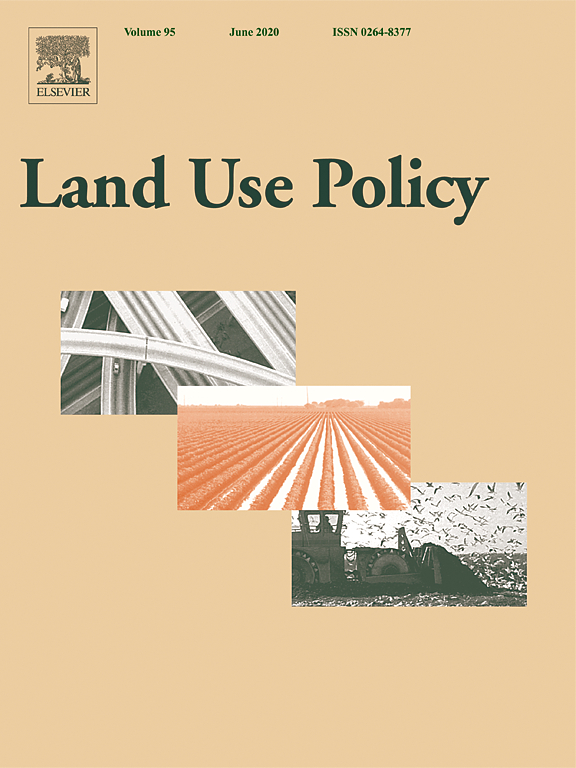Location
Land Use Policy is an international and interdisciplinary journal concerned with the social, economic, political, legal, physical and planning aspects of urban and rural land use. It provides a forum for the exchange of ideas and information from the diverse range of disciplines and interest groups which must be combined to formulate effective land use policies. The journal examines issues in geography, agriculture, forestry, irrigation, environmental conservation, housing, urban development and transport in both developed and developing countries through major refereed articles and shorter viewpoint pieces.
Land Use Policy aims to provide policy guidance to governments and planners and it is also a valuable teaching resource.
ISSN: 0264-8377
Members:
Resources
Displaying 76 - 80 of 279Stakeholder power relations in Land Value Capture: comparing public (China) and private (U.S.) dominant regimes
Understanding stakeholder power relations—such as between land sellers, land buyers, and local governments—is crucial to understanding Land Value Capture (LVC). While scholars have focused on stakeholder relationships through approaches such as stakeholder salience, stakeholder interaction, stakeholder value network, and stakeholder multiplicity, much research either places insufficient focus on power or only stresses partial attributes of power. As a result, the role of power relations among key stakeholders in LVC remains insufficiently explored.
Solving Brazil's land use puzzle: Increasing production and slowing Amazon deforestation
Brazil has become an agricultural powerhouse, producing roughly 30 % of the world’s soy and 15 % of its beef by 2013 – yet historically much of that growth has come at the expense of its native ecosystems. Since 1985, pastures and croplands have replaced nearly 65 Mha of forests and savannas in the legal Amazon. A growing body of work suggests that this paradigm of horizontal expansion of agriculture over ecosystems is outdated and brings negative social and environmental outcomes.
Knowledge flows: Farmers’ social relations and knowledge sharing practices in ‘Catchment Sensitive Farming’
The move towards sustainable agriculture requires a more detailed understanding of farmers’ knowledge(s) and knowledge practices. Increasingly, it is important to understand not only what farmers understand, but how their knowledge practices incorporate others – especially given the emerging call for environmentally-orientated policy measures to move beyond an individual farmer focus. This paper considers how farmers engage with, utilise and share knowledge through a focus on the Catchment Sensitive Farming (CSF) initiative in the UK.
Perspectives on agriculturally used drained peat soils: Comparison of the socioeconomic and ecological business environments of six European regions
In Northern, Eastern and Central European countries, peat soils drained for agriculture are a considerable source of greenhouse gas emissions. Since emissions from this source have high mitigation potential, they will likely be a focus of the European Union’s future climate goals. We describe and compare the similarities and differences in the socioeconomic and ecological business environment that policy makers, planners and farmers are confronted with when developing tailored proposals for low emission land use alternatives on peat land.
Hybrid land tenure administration in Dunoon, South Africa
Hybrid land tenure administration occurs in a number of South Africa’s state-subsidised housing projects and in the informal settlements from which the housing beneficiaries tend to be drawn. Ownership is the tenure form in most of these housing projects. Under ownership the law only recognises registered land transactions. Non-government tenure administration in Dunoon was organised by street and area committees that are part of the local South African National Civics Association (SANCO) branch, a community based organisation (CBO).





